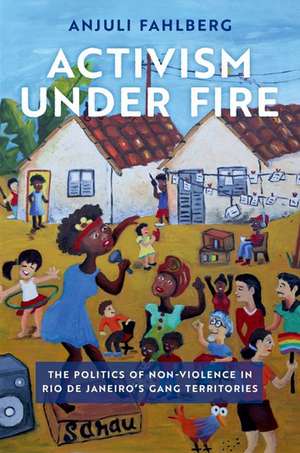Activism under Fire: The Politics of Non-Violence in Rio de Janeiro's Gang Territories: GLOBAL AND COMPARATIVE ETHNOGRAPHY SER
Autor Anjuli Fahlbergen Limba Engleză Paperback – 17 iul 2023
Preț: 136.52 lei
Preț vechi: 155.59 lei
-12% Nou
Puncte Express: 205
Preț estimativ în valută:
26.13€ • 28.37$ • 21.95£
26.13€ • 28.37$ • 21.95£
Carte disponibilă
Livrare economică 21-27 martie
Livrare express 18-22 martie pentru 47.01 lei
Preluare comenzi: 021 569.72.76
Specificații
ISBN-13: 9780197519332
ISBN-10: 0197519334
Pagini: 312
Ilustrații: 24 b/w photographs; 4 maps
Dimensiuni: 234 x 157 x 17 mm
Greutate: 0.47 kg
Editura: Oxford University Press
Colecția OUP USA
Seria GLOBAL AND COMPARATIVE ETHNOGRAPHY SER
Locul publicării:New York, United States
ISBN-10: 0197519334
Pagini: 312
Ilustrații: 24 b/w photographs; 4 maps
Dimensiuni: 234 x 157 x 17 mm
Greutate: 0.47 kg
Editura: Oxford University Press
Colecția OUP USA
Seria GLOBAL AND COMPARATIVE ETHNOGRAPHY SER
Locul publicării:New York, United States
Recenzii
How is social mobilization possible in gang territories? Anjuli Fahlberg's research answers this question, affirming the necessity to differentiate favela activism from traditional social movements. Activism under Fire is a powerful concept to understand the strategy of non-violence adopted by political actors as part of their resistance and adaptation to violent and restrictive contexts. Fahlberg's original participatory field research reveals how favela activists have constructed a sphere of non-violent politics, which operates politically parallel to, and symbolically in opposition to, the sphere of violent politics in the neighborhood.
This book is a gem. Anjuli Fahlberg writes this 'conduit of stories' with a refreshing self-awareness and respect for her community collaborators, gracefully integrating grassroots ethnography with the academic literature. What she calls 'pragmatic resistance' in the City of God is something I have observed in Rio's favelas over the past three decades as turf wars between drug gangs and their dance with the police and militias have taken lethal violence to new extremes.
Fahlberg offers a compelling sociological analysis of favela movements that bears new theoretical approaches to movements of non-violence. Highly recommended. Lower-division undergraduates through faculty.
Moving beyond a narrative of drug gangs and police forces, Fahlberg uses favela residents' own voices in one of Brazil's most famous favelas to illustrate how non-violence movements organize and mobilize... Fahlberg offers a compelling sociological analysis of favela movements that bears new theoretical approaches to movements of non-violence.
This book is a gem. Anjuli Fahlberg writes this 'conduit of stories' with a refreshing self-awareness and respect for her community collaborators, gracefully integrating grassroots ethnography with the academic literature. What she calls 'pragmatic resistance' in the City of God is something I have observed in Rio's favelas over the past three decades as turf wars between drug gangs and their dance with the police and militias have taken lethal violence to new extremes.
Fahlberg offers a compelling sociological analysis of favela movements that bears new theoretical approaches to movements of non-violence. Highly recommended. Lower-division undergraduates through faculty.
Moving beyond a narrative of drug gangs and police forces, Fahlberg uses favela residents' own voices in one of Brazil's most famous favelas to illustrate how non-violence movements organize and mobilize... Fahlberg offers a compelling sociological analysis of favela movements that bears new theoretical approaches to movements of non-violence.
Notă biografică
Anjuli Fahlberg is Assistant Professor of Sociology at Tufts University. Her research focuses on social movements and urban violence in Latin America and employs a participatory action research approach.
